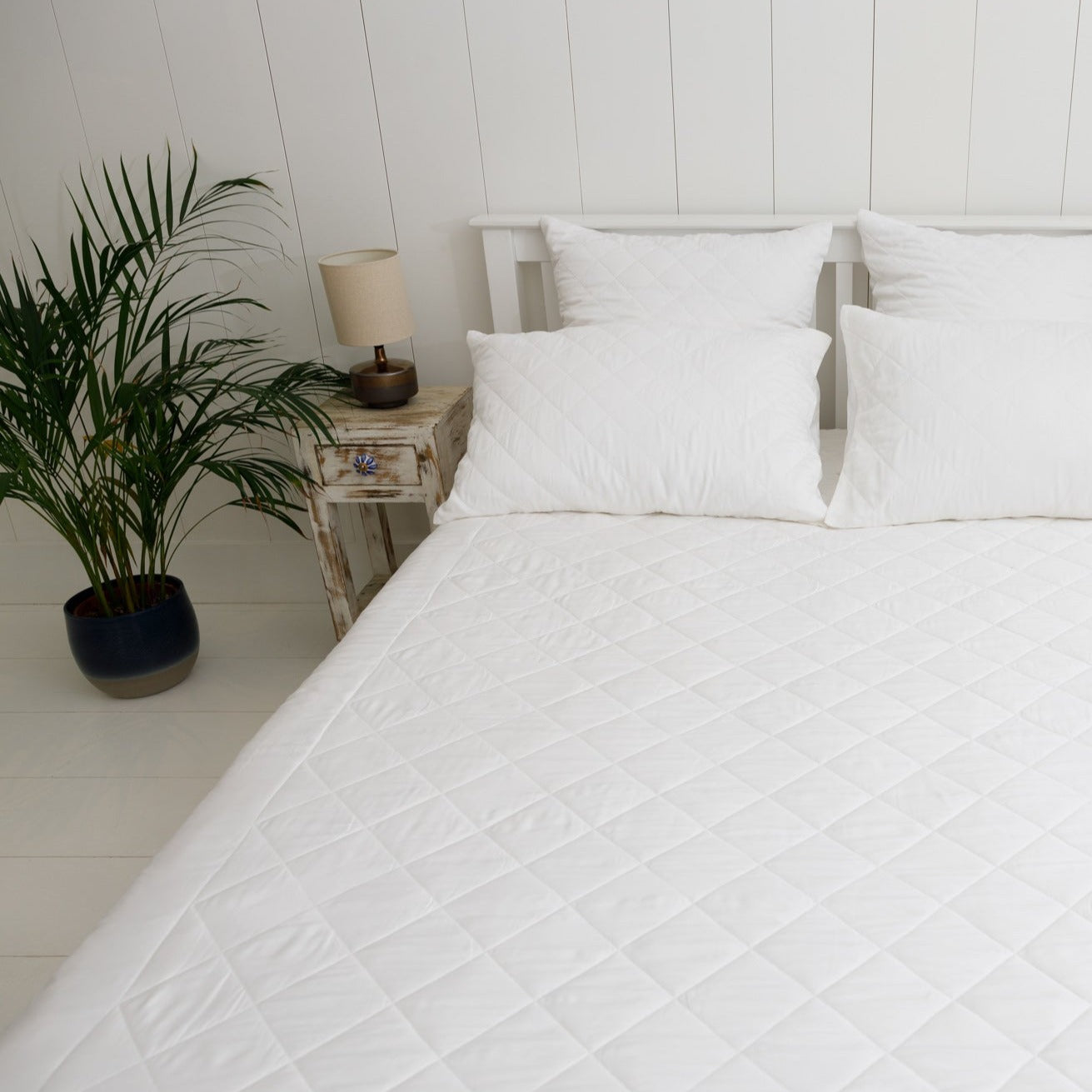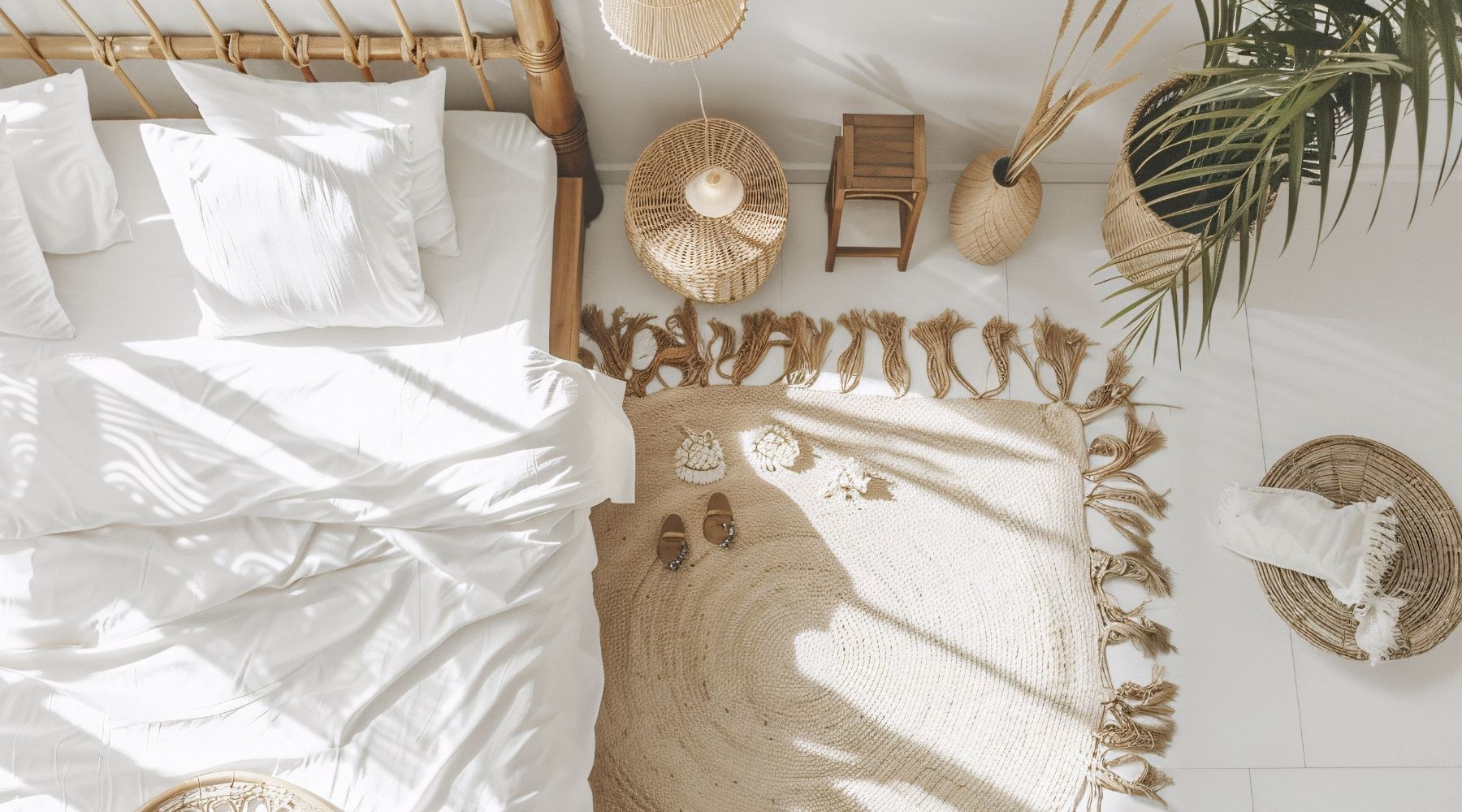Introduction
Your mattress is one of the most important investments you’ll ever make for your sleep and wellbeing. On average, we spend about a third of our lives in bed - but without protection, even the best mattress can wear out prematurely. Spills, dust mites, sweat, and bacteria all shorten a mattress’s lifespan and can affect your health.
That’s where a mattress protector comes in. Designed to safeguard your bed, a good protector not only prevents damage but also enhances comfort and regulates temperature. Today, the best mattress protectors go far beyond basic functionality: they can be waterproof, organic, and breathable - sometimes even all three at once.
In this guide, we’ll compare different types of mattress protectors, share tips on choosing the right one, and show you how to care for it properly. Along the way, we’ll also highlight how Ethical Bedding’s sustainable eucalyptus and bamboo protector fits naturally into this category.
Why Use a Mattress Protector?
Think of your mattress protector as the unsung hero of your bed. It quietly works in the background to:
-
Defend against spills and stains: Protects your mattress from water, coffee, or accidental spills that can leave permanent damage.
-
Extend mattress lifespan: Keeps the structure and fillings intact for longer, saving you money over time.
-
Improve hygiene: Blocks sweat, dead skin, dust mites, and bacteria that build up invisibly over time.
-
Enhance comfort: Adds an extra layer of softness or plushness, depending on the materials used.
-
Support better sleep: Breathable fabrics regulate temperature and wick away moisture, ensuring you stay cool in summer and cosy in winter.
Skipping a mattress protector is like driving without insurance: you might be fine for a while, but one accident could leave lasting damage.
Types of Mattress Protectors
There’s no one-size-fits-all when it comes to protectors. Each type is designed with specific needs in mind. Let’s break down the three most common options.
1. Waterproof Mattress Protectors
Best for: Families with children, pet owners, or anyone who needs maximum spill protection.
-
Pros: Offers a strong barrier against liquids, preventing permanent stains and damage. Particularly useful for young children or households where spills are common.
-
Cons: Many waterproof designs rely on plastic or polyurethane layers that can feel hot, noisy, or less breathable. Some sacrifice comfort for practicality.
Waterproof protectors can be a great choice if spills are your main concern, but for everyday comfort and breathability, they often fall short.
2. Organic Mattress Protectors
Best for: Eco-conscious sleepers, allergy sufferers, and those seeking a natural, chemical-free sleep environment.
-
Pros: Made from natural fibres like organic cotton, bamboo, or eucalyptus. Free from pesticides, herbicides, and harsh chemicals. Naturally hypoallergenic and gentler on sensitive skin.
-
Cons: Some organic protectors are not fully waterproof - but their natural fibres often regulate moisture better than synthetics.
Ethical Bedding’s mattress protector is crafted from 100% eucalyptus fibre with an organic bamboo fill. The eucalyptus shell feels silky smooth while resisting dust mites and mould, and the bamboo provides breathable cushioning. Both materials are Oeko-Tex certified and sustainably grown, making this protector healthier for your skin and the planet.
Unlike conventional cotton, eucalyptus uses 95% less water to produce and requires no harmful pesticides - a win for both durability and sustainability.
3. Breathable Mattress Protectors
Best for: Hot sleepers, those in warm climates, and anyone prone to night sweats.
-
Pros: Promote airflow, wick away moisture, and prevent overheating. Help maintain a stable body temperature year-round.
-
Cons: Some breathable protectors lack strong waterproofing, so they’re better for comfort than heavy-duty protection.
Natural fibres like eucalyptus and bamboo excel here. They are naturally thermoregulating, keeping you cool in summer and warm in winter.
Tip: If overheating keeps you awake, breathable and organic protectors are far superior to synthetic waterproof options.
How to Choose the Right Mattress Protector
With so many choices available, here are the key factors to consider when selecting your protector:
-
Comfort: Do you want added softness? A quilted organic protector adds a plush layer, while thin waterproof styles prioritise function.
-
Breathability: If you run hot at night, choose natural fibres like bamboo, cotton, or eucalyptus.
-
Protection: Families and pet owners may prioritise waterproofing. Others may prefer moisture-wicking fabrics that balance comfort with protection.
-
Fit: Ensure the protector matches your mattress depth.
-
Sustainability: Look for eco-friendly certifications and materials grown with less water and no pesticides.
The best protector is one that meets your personal needs while improving both the quality and longevity of your mattress.
Caring for Your Mattress Protector
Like any bedding, your protector works hardest when invisible - but it still needs care to stay fresh. Here’s how to maintain it:
Washing
-
Wash every 1-2 months, or more often if you suffer from allergies.
-
Use cool or lukewarm water on a gentle cycle.
-
Avoid bleach and harsh detergents - they can weaken fibres.
Example: If you spill coffee, gently blot (don’t scrub) the stain, apply mild detergent mixed with water, and wash as normal.
Drying
-
Air-dry whenever possible to preserve fibre strength.
-
If using a dryer, choose a low-heat setting and remove promptly to avoid shrinkage.
Storage
-
Store in a breathable cotton bag, not plastic, to prevent trapped moisture.
-
Rotate with your sheets and duvet covers to distribute wear evenly.
For more detailed advice for mattress protectors, read our article on Care Habits for Longevity.
Eco-Benefits of Choosing Organic & Breathable Protectors
Durability isn’t just good for your wallet - it’s good for the planet too.
-
Reduced waste: Longer-lasting protectors mean fewer replacements. In the UK, 300,000 tonnes of textiles end up in landfill every year.
-
Water savings: Eucalyptus production uses up to 95% less water compared to conventional cotton.
-
Lower carbon footprint: Extending the lifespan of home textiles by just 9 months can reduce environmental impact by up to 30%.
-
Biodegradability: Organic fibres like eucalyptus and bamboo naturally break down at the end of their lifecycle, unlike polyester which can take centuries.
Conclusion
Mattress protectors are essential for extending the life of your bed, keeping it hygienic, and improving your comfort. Waterproof protectors are ideal for accident-prone households, organic protectors create a healthier, chemical-free sleep environment, and breathable protectors help hot sleepers stay cool.
For many people, the best choice is a protector that blends these qualities. That’s where organic and breathable protectors made from eucalyptus and bamboo stand out. Naturally hypoallergenic, sustainable, and luxuriously soft, they offer long-term comfort without compromising protection.
By investing in a high-quality protector, you’ll not only protect your mattress but also enhance your nightly rest. Explore Ethical Bedding’s Eucalyptus Mattress Protector to experience eco-luxury that lasts.








Share:
Why Organic Bedding Lasts Longer (and How to Care for It)
Bedding Sets vs Separates: Which Offers Better Value?